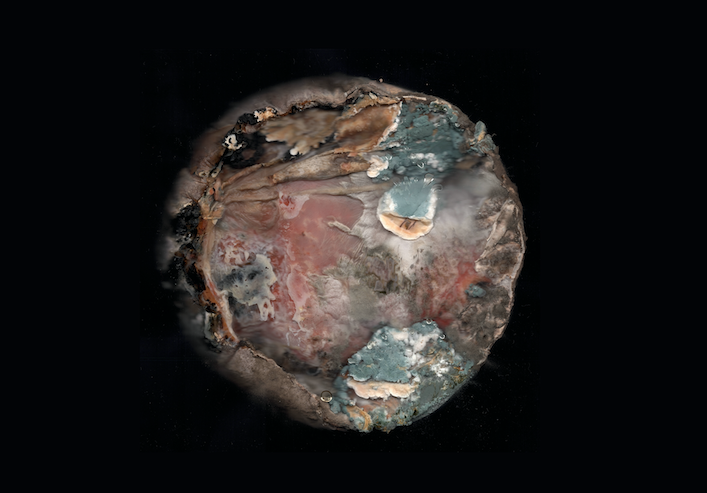Speculative Interviews
Guests
La Casa Encendida Radio
Pablo Durango, Fabiana Vinagre, Costa Badía, Javier Cruz, María Jerez, María Acaso
Typology
Podcast
Year
2021 / 2022

This program is a space in which to participate in the visualization of futures, navigating between utopia and dystopia, the dreamlike and the real, the possible and the impossible. Through these types of dialogues, we can project images of new desirable worlds, attending to, cultivating, and caring for the relationships between their agents, both human and non-human, and their ecosystems. We propose to imagine worlds within worlds, people within universes, and worlds together as new frameworks from which to understand postnature, and thus enhance relationships between different fields of knowledge that blur the boundaries between artistic and academic research, theory and practice, science and art, culture and nature.
Episodes
Pablo Durango
"This cosmic identity, as it moves through the universe, is dying, but dying not perhaps in the human concept, but disintegrating to become part of the universe in another way. It is like a kind of transformation of energy that is releasing small pieces in the form of asteroids that are falling into different planets of the Milky Way. One of the pieces fell on a human settlement a long time ago, before the Roman Empire existed, near the area of the Roman Empire. So, these meteorite pieces, being a very otherworldly thing, the people of that time interpreted it as a kind of gift from the gods and they started to worship this substance and at a certain point they thought of ingesting this substance as if it was a kind of drug...".Fabiana Vinagre
"In this home, I focused a lot on the objects, on the things that are in the home that make up the home, but beyond their utility and their practical function, they configure the space and configure how to be in that space. And everyone has a very different relationship with those objects. So, from there we began to test the sounds, how an object sounds beyond its use, beyond the way I normally manipulate that object, like looking at a body and seeing it from another angle than its functionality. Conversations are generated there, conversations based on the objects, conversations without words, only with sounds, and the objects show microworlds within a home as if many corners are universes. It also reminds me of a story that tells that in every corner of a room there is a world that has different worlds inside. And for me, the objects are a way of opening a portal to those worlds."Costa Badía
"I imagine a space that transforms continuously, a jelly space that transforms depending on the person who needs it. It moves, just like the stairs at Hogwarts, the stairs that move from one side to the other, that's how I imagine it in terms of architectural accessibility. And then I think it is essential to educate and train the people who work in the museum, in my case to talk about functional diversity, but also to talk about any kind of diversity. What happens is that it is also complicated to understand that there are many ways of living. People can more or less empathize with functional diversity, although it is often from the point of view of pity, from the "poor thing". I imagine a gelatinous space, with gelatinous people."Javier Cruz
"How nice to think that our body doesn't end at the nostrils or the mouth, but ends at the bottom of the organ. The pituitary ends much farther, even down to the endocrine system. Just as the terrestrial body does not end in the siliceous crust, but ends in the stratosphere, and in between, there are many layers. Those who have told us what our planet looks like from far away describe a body that ends in its most gaseous zone, which is the one that escapes a little bit more from gravity or from the atoms that are a little bit more accelerated and that heat up and goes away and move away, but that is exactly the same as ours."María Jerez
"I believe that a child can teach you the same as an adult. For example, in María va a la escuela, a project in which the children of a school teach me their language that I don't know, it is interesting precisely how they begin to speculate when they don't know exactly the exact meaning of a word. I don't know the language, but they don't know how to teach it to me. So they have to invent how to teach it to me. The methodology is precisely the lack of it. In that not knowing appears a power that has nothing to do with the idea of exercise and the search for its solution, but in entering a place of darkness, where neither you nor I know. I try to start with a very simple statement, knowing that the statement is only the excuse to get out of it."María Acaso
"Orgies should be a daily affective-sexual format, because that is what was lived in prehistoric times. What is really strange is that, in order to have sex, you have to be only two people, heterosexuals, in a room and on top of that you have to do it all your life with the same person. That's just crazy. On the other hand, no, what is crazy is that several people get together and have sex. Besides, we have the imaginary of Eyes Wide Shut and if it's not that, it's not an orgy. Well, no. What's more, I think it would be much more interesting to live sexuality in a public space like nature or for that to be normal and ordinary."You can listen to all interviews through La Casa Encendida Radio, or click here!





